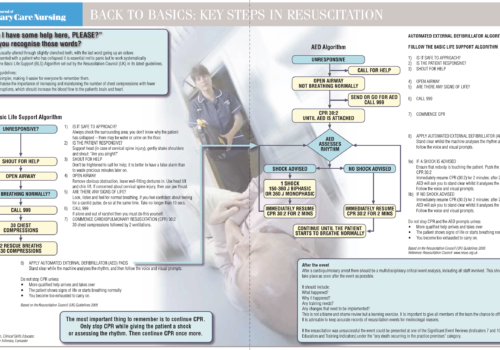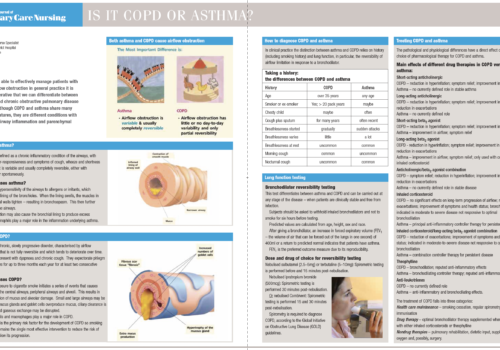Asthma medications should routinely be delivered by a pressurised metered dose inhaler
(pMDI) and spacer system, with a facemask where necessary, in children under five,
according to the National Institute for Health and Clinical Excellence (NICE).1
For older children, aged 5-15 years, NICE has advised that a child’s therapeutic needs,
the ability to develop and maintain an effective technique, the suitability of a device for the
child’s and carer’s lifestyles (ie portability and convenience) and the likelihood of good
compliance are the factors that should govern the choice of device.2 Only once these factors
have been taken into account, should choice be made on the basis of cost minimisation.
Cough as a Presenting Symptom in General Practice
Cough is a common presenting symptom in primary care. It has a prevalence of 30% in
the general European population, and in a US National Medical Case Survey in 1991
cough was the commonest presenting complaint. Between 10% and 38% of all new
patient referrals to UK hospital chest clinics are for chronic cough. This article covers
the physiological nature of cough and its role as an essential protective reflex, focuses on the
differential diagnosis of cough in general practice in both adults and children, and discusses the
use of treatment as a diagnostic tool.
Back to Basics: Key steps in resuscitation
Urticaria and angioedema
Allergic diseases such as hayfever and allergic asthma are becoming increasingly common
in westernised countries such as the United Kingdom, with an estimated 25% of the
population now suffering from some form of allergic condition. Urticaria and angioedema
are commonly thought of as allergic problems although in general only acute symptoms
are related to allergen exposure. Here we discuss the diagnosis and management of urticaria and
angioedema in primary care, with particular focus on identifying allergic triggers and managing
long-term symptoms successfully.
Seven Steps to a Successful Flu Vaccination Campaign
Planning a flu vaccination campaign during the autumn is always a difficult concept to
take on board. But, from experience, the earlier you plan a campaign, the more
successful it will be. Adequate planning and organisation will ease the pressure on all
members of the team during a very busy period. It will also ensure that all patients in
the ‘at risk’ groups are vaccinated and targets achieved. This article gives seven easy steps for a
stress-free flu vaccination campaign.
Non-respiratory causes of breathlessness
Abnormal breathlessness is a common symptom with a wide variety of causes and it can
be quite a challenge to diagnose the cause and plan appropriate treatment. Practice
nurses are often the first point of contact for patients with these conditions and play an
important role as part of the multidisciplinary healthcare team. This article completes a
series of three on causes of breathlessness (‘The breathless patient: is it asthma or COPD?’ Vol 2,
Issue 1, December 2007 and ‘Respiratory causes of breathlessness.’ Vol 2, Issue 2, March 2008).
Food Allergy in Childhood
Milk, eggs and peanuts are the most common foods causing allergy in early childhood.
The prevalence of these allergies is on the increase. A thorough clinical history
together with an allergy test allows for a clear diagnosis and implementation of a
comprehensive management plan. This article outlines some of the key features in
diagnosing and managing childhood allergies.
Community Pharmacists: Part of the Healthcare Team
The image of community pharmacy and the role of the community pharmacist have changed
substantially over the past 5-10 years. Things are set to keep changing with the newly
published White Paper for pharmacy in England and the continued restructuring of the
health service in Scotland. The community pharmacist’s role will become much more
integrated into the multi-professional care of patients.
Back to Basics: Is it COPD or asthma?
To be able to effectively manage patients with
airflow obstruction in general practice it is
imperative that we can differentiate between
asthma and chronic obstructive pulmonary disease
(COPD). Although COPD and asthma share many
clinical features, they are different conditions with
different airway inflammation and parenchymal
patterns.
Tuberculosis
Cases of tuberculosis (TB) have been increasing over the past few years, with recent data
from the Health Protection Agency showing a rise of 2% from 2005 to 2006 in England,
Wales and Northern Ireland, following a rise every year since the late 1980s. Although
London continues to account for the highest proportion of cases – 42% – there have
been outbreaks throughout the country. In this article, we review the cause, pathology, clinical
investigations, diagnosis and management of TB.
Self-Management in Asthma
Good self-management is obviously a central part of achieving effective control of any
chronic condition. It is particularly important in asthma to help patients manage
exacerbations, which can sometimes develop with little warning and with serious
consequences. This article provides a step-by-step guide to developing effective selfmanagement
plans for patients with asthma by providing practical solutions to key questions
underpinning the process.
Multimedia Tools to help Smokers who want to Quit
This year there is more reason than ever for people to stop smoking, with the ban on
smoking in public places coming into force in July. How can we support smokers
who want to quit? In this article, we provide a comprehensive guide to resources
that can help.

























